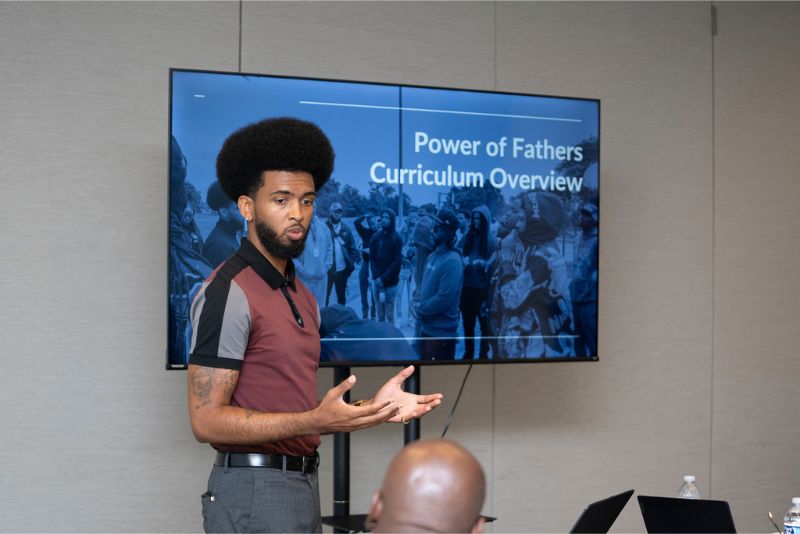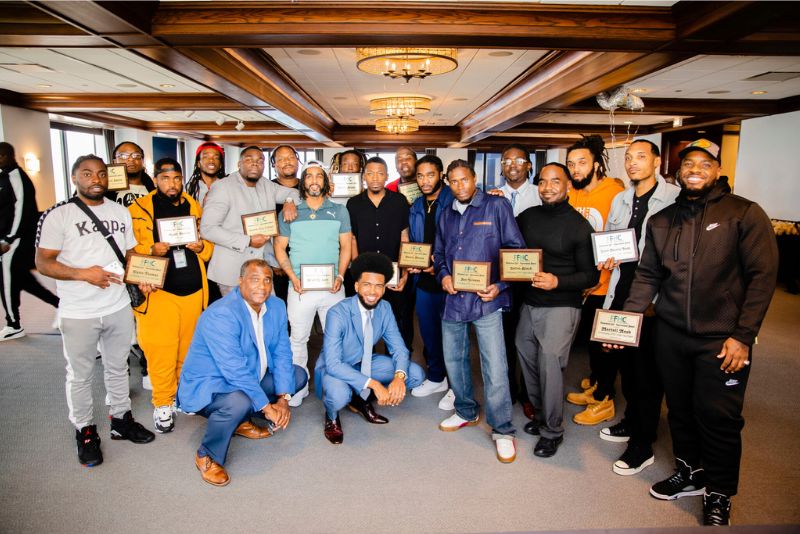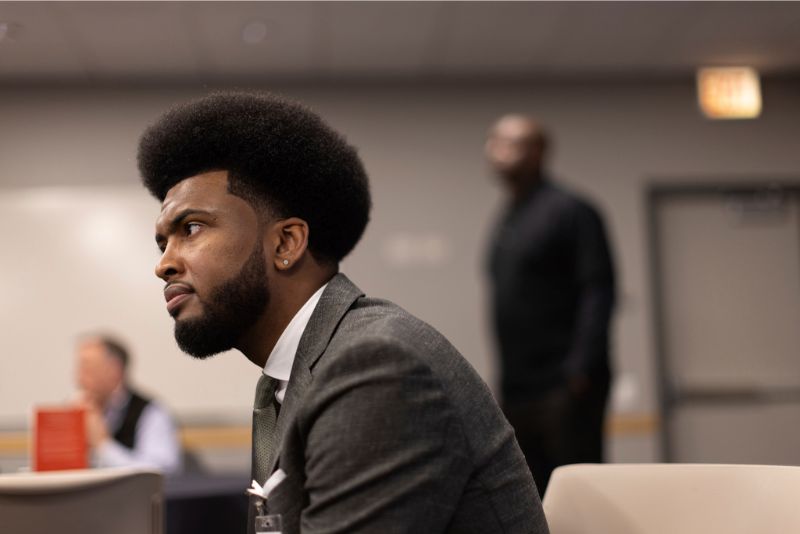
Restoring Black Fatherhood: Chicago’s Dr. Clinton Boyd Jr. Champions Healing and Hope Through FFHC
Dr. Clinton Boyd Jr., executive director of Fathers, Families & Healthy Communities, shares his personal journey, mission, and vision for empowering Black fathers and building stronger communities through healing, education, and faith (All Photos Courtesy of Dr. Clinton Boyd Jr.).
As an advocate for uplifting Black men, I had the opportunity to meet Dr. Clinton Boyd Jr. in April at The Imperative of Investing in Black Men and Fathers in Chicago, an event hosted by the City Club of Chicago.
In 2021, Dr. Boyd Jr. became the executive director of Fathers, Families & Healthy Communities, bringing both lived experience and academic expertise to the role. He embodies the power of collaboration and community building, consistently advocating for the vital role these efforts play in driving meaningful change for Black men and fathers, particularly in areas such as education, financial empowerment and mental health.
Partnering with organizations like EAT (Equity and Transformation) has been an honor for Dr. Boyd, as their missions align with serving the same population of Black men, fathers and the community.
“I became a father at the age of 15. That experience transformed me — it broke me down and rebuilt me simultaneously,” Boyd explains. “I was still trying to figure out who I was, and suddenly I had to be responsible for someone else’s life. Holding my daughter for the first time forced me to reflect deeply on who I was becoming. I had to choose: Would I be defined by the limitations the world placed on me, or would I break through those constraints and create a new path? I chose the latter.
“The world expected me to fail, to disappear. But fatherhood gave me purpose. It became the reason I stood up. It has been the foundation of everything I’ve done, both personally and professionally. And that’s why I fought so hard for Black fathers today. I know what’s possible when we’re not ashamed or judged but are seen, supported and surrounded by love.”

In an exclusive interview for the Chicago Defender Boyd reflected on the importance of standing in solidarity with like-minded brothers who share the same commitment to empowering men, fathers, women and children within Black communities.
Marshelle Sanders: What advice would you give to young fathers today who may be going through what you once did—young, scared, and unsure of what’s next?
Dr. Boyd Jr: The first thing I’d say is to have faith in God. Truly believe He’ll make a way out of no way—but make sure your actions align with that belief. Next, lean deeply into your support systems. I was fortunate to have parents, grandparents, my co-parent and an extended family who all supported me unconditionally. Without that network, I wouldn’t have been able to make it. Don’t take those people for granted. God places special people in our lives to help us find our way.
And finally, discover your life’s purpose. Becoming a father so young helped me realize mine. I knew I wanted to support Black men and fathers, and that clarity gave me direction. I encourage young fathers to tap into what they’re passionate about and pursue it with intention, making it a reality.
Sanders: Let’s talk about education. You stated how school helped shape your path. How did you navigate that journey while being a young father, and how did education help you discover your purpose?
Boyd: That’s an important question. I’d always been told I was intelligent and capable, but like many young boys, I got caught up in things outside of school. That lack of focus is part of what led me to become a young father. But pursuing education changed everything. It gave me tools, access, and perspective—and it ultimately put me in the position I’m in today.
I had to be strategic and patient. I made careful decisions about where I went to school, how I’d fund it and how I’d finish, not just start. From undergraduate studies to a Ph.D. and then a postdoctoral position at Duke University, every step was intentional.
However, I want to emphasize this point strongly; it’s not just about attending school. It’s about receiving the proper education, one that reflects who we are and speaks to our cultural heritage.
Too often, our young men aren’t dropping out—they’re being pushed out by systems and educators who don’t understand or value them. Curricula usually begin our history in 1619, overlooking the vast and rich legacy that preceded it. Our young people need to see themselves in what they’re learning, and until education centers our history, values and contributions, it will continue to miss the mark.
Sanders: Tell us more about the organization, Fathers, Families & Healthy Communities. What’s your mission, and why is this work so essential today?
Dr. Boyd Jr.: At Fathers, Families & Healthy Communities, our mission is straightforward: to enhance the quality of life for Black fathers in Chicago and beyond. We believe that Black fathers are essential to the safety, stability and strength of our families and communities.
For too long, society has treated Black fathers as liabilities, not assets. Our work is about rewriting that narrative. We want Black men and fathers to be revered, not feared. To be recognized as the valuable contributors they are, not just to their families but to the broader community.
We take a comprehensive approach. We offer peer support groups, health and wellness services and legal aid in areas such as child support and custody. Additionally, we work to connect our men with jobs of the future. We also partner with other organizations throughout the city to advance this mission.
This is more than a program—it’s a movement to uplift and empower Black fathers to thrive, because when they thrive, so do our families, and so does our community.

Sanders: Dr. Boyd, I appreciate that you highlighted particularly the depth of involvement fathers have in shaping FFHC’s work. Can you expand on that?
Boyd: One of the things that truly sets FFHC apart is that we see our fathers as partners, not just participants. They actively co-design and co-develop everything we do, from our programs to our policy and advocacy work. We employ a bottom-up approach, rather than a top-down one, and this philosophy is deeply ingrained in our organizational values.
Much of our work is inspired by an Afrocentric worldview, which emphasizes communalism over individualism. We intentionally move away from that rugged individualism often celebrated in American culture. Our ancestral and cultural history has always prioritized the community over the individual. We operate from that same framework because it honors who we are at our core.
But we do not compromise our values. We will not yield to external forces that don’t have the best interests of our fathers in mind. We’re here to walk with our men—no matter what they’re facing—and we do so with love, accountability, and unwavering belief in their potential.
At FFHC, we believe our men are more than the worst thing they’ve ever done. Redemption is not just a theme—it’s the foundation of our work.

Sanders: Dr. Boyd, that was inspiring, especially what you said about restoring Black men. It hit home for me. You wear many hats and do so much important work—what keeps you grounded and focused through it all?
Dr. Boyd Jr: Honestly, it’s my unshakable faith in God, specifically, the God of justice and righteousness. The deeper I go into this work, the more I lean on scripture to sustain me. It gives me strength, perspective, and constant reminders that I’m doing this for the right reasons.
To read this interview in its entirety visit chicagodefender.com
For More information on how to connect with Dr. Clinton Boyd Jr. and the Father’s, Families & Healthy Communities, please visit www.ffhc.org.
